2,000 Students Sign Petition Against Regime Oppression
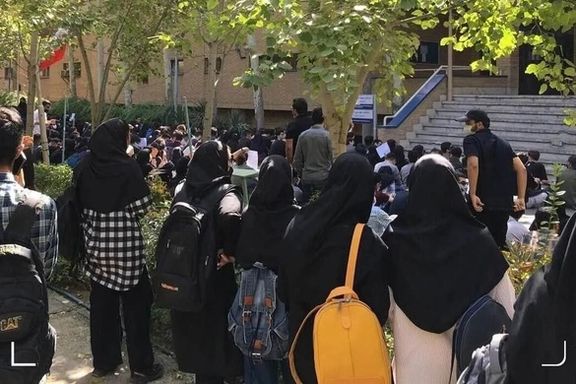
Over 2,000 students at Iran’s Tabriz University signed a petition against the regime’s punishment of students as it continues to quash dissent.

Over 2,000 students at Iran’s Tabriz University signed a petition against the regime’s punishment of students as it continues to quash dissent.
Over 2,000 students at Iran’s Tabriz University signed a petition against the regime’s punishment of students as it continues to quash dissent.
The protesting students at Tabriz University of Medical Science emphasized the right to freedom of expression and assembly.
"The students … must not be threatened, suspended, or exiled,” read the petition, with many students found supporting protests banned from classes and dormitories as the regime tries to suppress dissent.
Addressing the university officials and the disciplinary councils, the Tabriz University students said: "You have no right to silence and oppress the students with coercive measures and adverse rulings.”
According to the US-based Human Rights Activists News Agency (HRANA), 637 students from 144 universities have been arrested since mid-September, students at the forefront of the unrest sparked in September by the death in custody of Mahsa Amini.
Universities have been the center of several large anti-regime demonstrations with some sources inside Iran claiming that the number of detained students is more than 700.
A few days ago, the students of six universities wrote a statement condemning the government's misuse of psychological methods to suppress protests.
Earlier, Iran’s Student Union Council said 435 students have been suspended or expelled following the recent protests across the country.
In a statement on April 12, the Council stated that "a significant number of students have received suspension and expulsion orders through an illegal process."
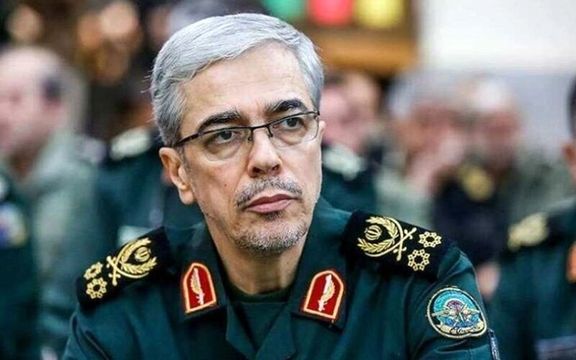
The chairman of the chiefs of staff of the Iranian armed forces claims the balance of power has shifted from West to East, away from its archenemy the US.
Brigadier General Mohammad Baqeri, who headed a top military delegation to Muscat at the request of his Omani counterpart, said Monday that in recent years, the region has been “the scene of swordplay by the Americans, who tried to impose themselves as absolute rulers on the world and the region.”
Baqeri stated that regional collaboration outweighs Western influence. “We are all in the same region and therefore we understand our interests better than others. We believe that regional security can be ensured by the solidarity of the regional states,” he said.
Iranian officials have been bragging over “new regional developments” and a “new order” after restoration of diplomatic relations with Saudi Arabia in March.
Regime officials and its ideological gurus have been making the most of the agreement being a US strategic defeat because Riyadh agreed to the deal with China’s tutelage, excluding Washington.
However, hardliners are praising Supreme Leader Ali Khamenei’s “wisdom” in predicting a decline of the American world order, citing the Chinese-sponsored agreement with Saudi Arabia.
After years of hostility that fueled conflicts across the Middle East, Tehran and Riyadh agreed to end their diplomatic rift and re-open embassies in a major deal.
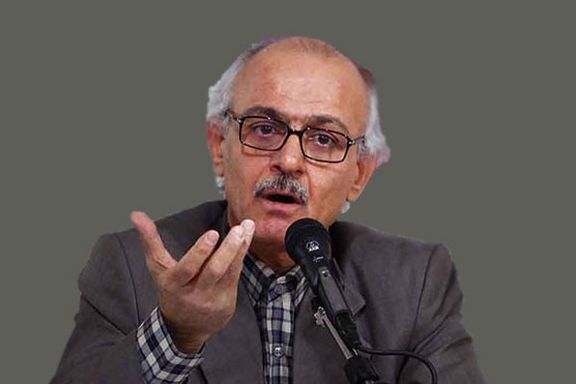
Iran’s security agents searched the house of historian and university professor Hashem Aghajari before summoning him to court.
The agents ransacked the home on Sunday in spite of his not being there, ignoring pleas from his wife and daughter to wait until his return.
Aghajari, considered one of the political figures close to the Green Movement leader Mir-Hossein Mousavi, was among the speakers of the "Dialogue to save Iran" conference, which was held virtually two weeks ago on the Clubhouse platform. He signed Mousavi's last statement which called to end clerical rule in Iran.
When the university professor returned home, the agents of the ministry of intelligence seized his laptop and other electronic devices, telling him that he should appear in the Revolutionary Court on Wednesday.
It is likely he will be charged with threats to state security for his role in revolutionary activity. At the recent conference, the group’s statement made bold calls for the end of the regime and called for a referendum in what it says is the only way forward, “allowing the people to decide their own destiny”.
He is an all too familiar figure to the regime. In 2002, Aghajari was sentenced to death for apostasy after a speech he gave on Islam urging Iranians to "not blindly follow" Islamic clerics. In 2004, after domestic Iranian and international outcry, his sentence was reduced to five years in prison.
Keyvan Samimi, Alireza Beheshti Shirazi, Abdollah Momeni, Qorban Behzadian-Nejad, Narges Mohammadi and Alireza Hosseini Beheshti were among the other activist speakers of the online conference who were since summoned, arrested, or prosecuted.
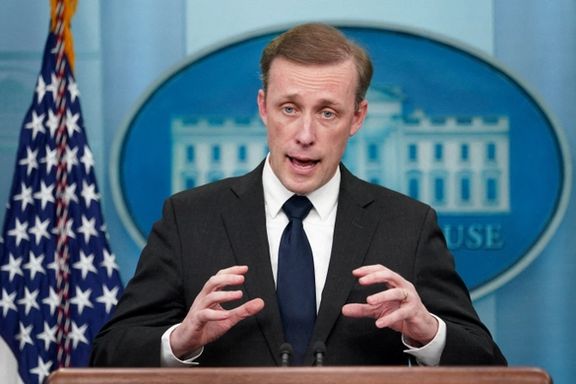
The overall picture of US National Security Advisor Jake Sullivan’s trip to Saudi Arabia and his meeting with Crown Prince Mohammed bin Salman remains somewhat unclear.
Sullivan met bin Salman on Sunday and reviewed what the White House called "significant progress" in Yemen peace efforts, but there was no acknowledgment if the expansion of the Abraham Accords or issues related to Iran were discussed, apart from the Yemen conflict.
A statement released by the White House said the two sides reviewed “significant progress in talks to further consolidate the new 15-month long truce in Yemen.”
There have been reports and speculations in recent weeks that the United States has been working to bring Saudi Arabia and Israel closer and expand the Abraham Accords that saw Saudi allies, the United Arab Emirates and Bahrain establish diplomatic relations with the Jewish state in 2020.
A senior Israeli security official said on Friday that Israel was hoping for a breakthrough in efforts to normalize its ties with Saudi Arabia during Sullivan's visit there.
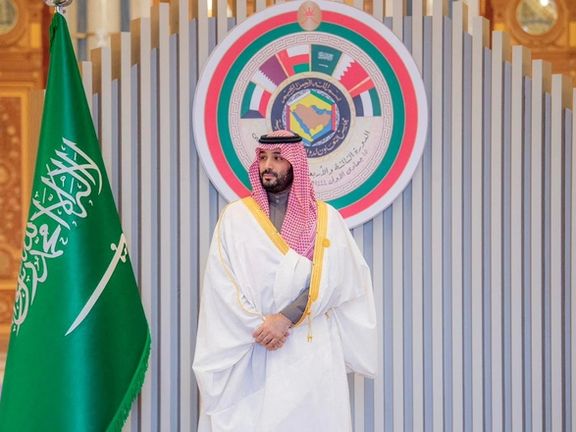
But the White House statement made no mention of Israel.
Saudi state media did not immediately publish either video or photographs of the meetings.
Saudi Arabia in March reached agreement with Iran to resume diplomatic relations, a deal that was brokered by China and seen as a sign of decline in American influence in the region, particularly with Riyadh.
Sullivan's meeting also came after a period in which US-Saudi ties have been damaged by oil production cuts by Saudi-led OPEC+ and differences over the 2018 killing of Washington Post journalist Jamal Khashoggi.
The Saudi state news report said only that the men reviewed “strategic relations” in a meeting that included other American officials.
Later, Sullivan took part in a meeting with the crown prince and Indian national security adviser Ajit Doval and Sheikh Tahnoon bin Zayed Al Nahyan, the national security adviser of the neighboring United Arab Emirates.
Washington is said to be interested in linking the Arab oil producing countries around the Persian Gulf in a rail network that would ultimately expand trade links with India, perhaps as a counterweight to growing Chinese influence.
A White House statement acknowledged the meetings, saying they aimed to “to advance their shared vision of a more secure and prosperous Middle East region interconnected with India and the world.” It did not elaborate.
Sullivan, President Joe Biden's top White House national security aide, also thanked the crown prince for Saudi support to US citizens during evacuation from Sudan, the statement added.
US special envoy Tim Lenderking travelled to Oman and Saudi Arabia earlier this month to seek to advance Yemen peace efforts, the State Department said.
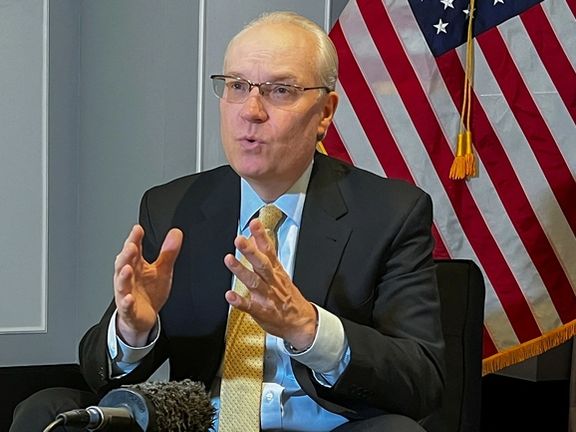
A Saudi-led military coalition intervened in Yemen in 2015 after the Iran-aligned Houthis ousted the government from the capital Sanaa.
A Saudi delegation, which is seeking a permanent ceasefire deal to end military involvement in the war, concluded peace talks in mid-April in Sanaa with the Houthi group, whose top negotiator said talks had made progress and further discussions would be held.
Yemen's conflict, which has killed tens of thousands of people and left millions hungry, has widely been seen as a proxy war between Saudi Arabia and Iran.
Based on reporting by Reuters, AP
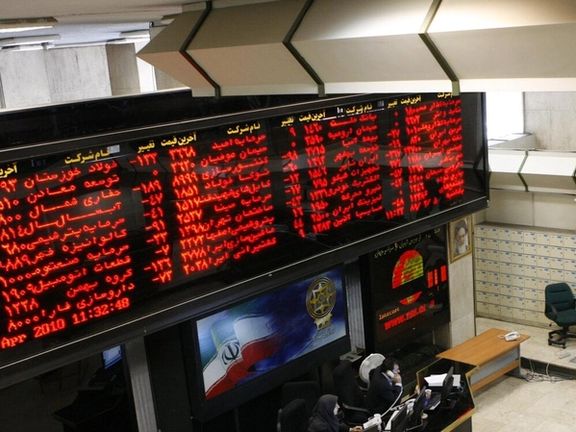
A five-percent fall in Iran’s stock market index in two days has led to a ban on trading that includes 90 percent of all shares on Monday.
Media in Tehran reported that Monday alone the index fell by more than two percent at the beginning of trading. Following a similar fall on Sunday, the decline on Monday led to most shares being “locked” and traders forming long lines to sell unwanted stocks.
Although the fall is not considered dangerously high by international standards, Iran’s stock market is controlled by the government and investors fear possible machinations in inflating and deflating the market.
In July 2020, Tehran’s stock market fell by more than 30 percent in one week and some shares by as much as 50 percent, wiping out the savings of many small investors who had believed government promises of a safe stock market. Some observers said that government entities had inflated the stock market and ripped large profits before its sudden fall.
The memory of the 2020 crisis has remained strong among investors who become jittery at any sudden downturn.
In recent days, government media was hyping positive news about the stock market and encouraging people to invest.
Fararu website in Tehran reported that sell orders totaling nearly $300 million were pending on Monday as the market closed.
Eighty percent of Iran’s economy is controlled by the government or large conglomerates controlled by the ruling regime. Tehran’s stock market is no exception as government appoints officials who control it.
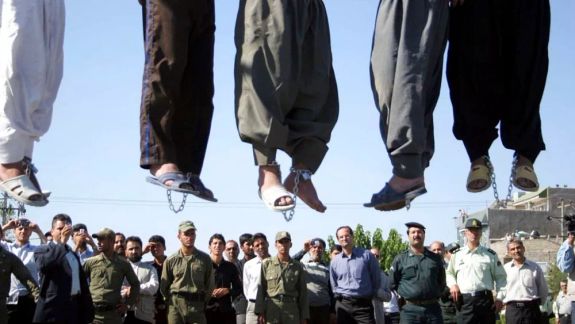
Two Iranians jailed for insulting religious entities have been hanged as the regime embarks on a killing spree to intimidate people against further protests.
The judiciary claimed Yousef Mehrad and Sadrollah Fazeli-Zare' were running dozens of online anti-religion platforms dedicated to the hatred of Islam, the promotion of atheism and insults to sanctities, however, in earlier reports the charges were mainly related to one Telegram channel.
Mizan, the judiciary’s news agency, did not announce when the pair were executed but it was known that they were transferred from their cell in Arak prison in preparation for execution, as is customary in Iran.
Mizan also claimed they had burnt copies of Islam’s holy book, the Quran, and they had confessed to their blasphemy. Their families and rights activists said the confessions were extracted under duress, which has proven to be the case in numerous confessions by the regime.
Mehrad, a father of three, and Fazeli-Zare', the caretaker of his mother, were arrested in May 2020 over blasphemy-related charges after authorities accused them and five others of being members of a Telegram channel titled "Critique of Superstition and Religion." Members of the group reportedly expressed opinions about Islam and its Prophet Muhammad that were deemed insulting by the Islamic Republic.
Mehrad, who was then transferred to Arak Prison from his hometown Ardabil, and Zare’ who was moved there after his arrest in the city of Yasouj, were apparently held in solitary confinement for two months and were denied family visits and phone calls, for which they went on hunger strike.
In April 2021, Branch 1 of the Arak Criminal Court sentenced Mehrad and Fazeli-Zare' to death for "insulting Islamic sanctities" and "insulting the Prophet". In June 2021, the Arak Revolutionary Court reportedly sentenced Mehrdad to eight years in prison in a separate criminal case for "propaganda against the state", "founding or leading an organization that aims to disrupt national security", and “insulting the Supreme Leader”.
Last week on May 5, the US envoy for Iran Robert Mally voiced worries about the imminent execution.
The news of their execution came a few days after Iran hanged a Swedish-Iranian political activist, sparking global outrage amid fears of further deaths. Habib Chaab, 49, former leader of the Arab Struggle Movement for the Liberation of Ahwaz (ASMLA), was hanged on Saturday morning, weeks after his sentence for “corruption on earth”, was confirmed by the judiciary.
The Islamic Republic authorities say Chaab was found guilty of leading ASMLA (Harakat al-Nidal in Arabic), a movement which advocates the separation of southwestern Khuzestan Province and for plotting "numerous bombings and terrorist operations" in the oil-rich province with a large Arabic speaking population.
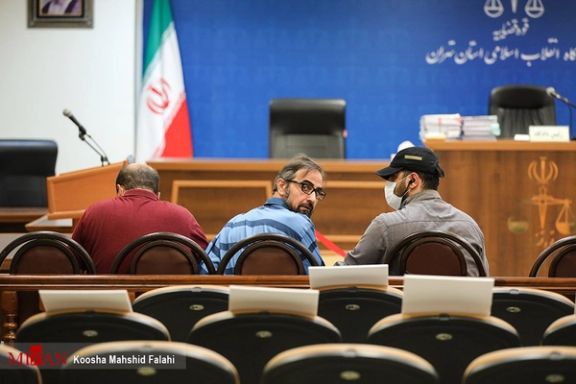
This weekend it emerged that three Iranian Arab prisoners who have been sentenced to death have now been moved to an unknown location, prompting fears that their execution is also imminent.
In February, the Ahvaz Revolutionary Court sentenced them to death along with three other prisoners on charges of "transferring currency and remittances through a foreign bank, armed attacks, and being associated with a political movement."
Norway-based monitoring group the Iran Human Rights Organization (IHR) said on Saturday that the Islamic Republic has carried out at least 42 executions in the past 10 days alone, or one person every six hours. At least 194 people have been executed this year so far.
States including the UK and EU continue to condemn the use of the death penalty. On Sunday, the British Foreign Minister James Cleverly issued a statement in the wake of Chaab’s death saying: “I am appalled at news the Iranian regime executed Swedish-Iranian dual national Habib Chaab. The UK strongly opposes the death penalty. We call on the regime to stop all executions, now. We will continue to work with Sweden and other partners to hold this regime to account.”